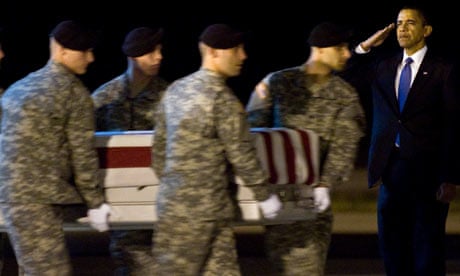Barack Obama last night came face to face with the true cost of the war in Afghanistan, as the remains of 18 US soldiers and drug enforcement agents were unloaded from a military aircraft and returned to US soil.
The unscheduled, late-night visit to Dover air force base came as the president debates whether to meet General Stanley McChrystal's request for tens of thousands more troops to fight Taliban and al-Qaida insurgents in Afghanistan. Since taking office, Obama has already ordered more than 21,000 additional troops into the country.
The fallen troops, whose return Obama observed, died in two separate incidents on Monday: a Chinook helicopter carrying seven soldiers and three drug enforcement agents crashed and eight soldiers were in a vehicle struck by an improvised explosive device in the Arghandab river valley.
The total of 55 US troops killed in Afghanistan this month have made it the deadliest month in the eight-year war. The US military has endured a brutal few months, testing the nation's resolve to pursue a war that Obama says is essential for its security. In all, 902 US troops and 222 British troops have died in the war.
Under George Bush, who launched the conflict in retaliation for the terrorist 9/11 attacks, news media were barred from observing the return of fallen troops through Dover airbase.
The Pentagon said the measure, in place since the administration George Bush Sr, guarded the families' privacy, but critics claimed the government was trying to obscure the conflict's human toll.
Obama overturned the ban this year, and allowed the families to choose whether to allow media coverage . Bush spent time with grieving military families but never went to Dover.
Shortly after midnight, Obama joined a party of White House aides, military leaders and his attorney general, Eric Holder, on the tarmac at the base in Delaware.
At a chapel on the base, the president met the families of the dead. Then he and his party boarded the C-17 aircraft that flew the remains home, listened as an air force chaplain said a prayer and watched six army pall-bearers wearing black berets and combat fatigues offload each flag-draped "transfer case" from the plane to a waiting vehicle.
Following the families' request, news media were permitted to witness only one transfer, that of Sergeant Dale Griffin of Terre Haute, Indiana, who was the last off the plane.
The president and his party saluted as the case was placed in a white mortuary van, and again as the van drove away.
Four hours later, Obama arrived back at the White House in the pre-dawn darkness and walked inside, alone.
